【Workshop Report】The 4th EU-Japan Young Scholars Workshop / 2021 International New Generation Workshop(2021.10.29-31)2022/01/12
Workshop Report The 4th EU-Japan Young Scholars Workshop /
2021 International New Generation Workshop
“Japanese Studies and Transnationalism”
Between October 29th to October 31st, Hosei University Research Center for International Japanese Studies has co-hosted an international workshop with the Consortium for Global Japanese Studies and Centre Européen d’Études Japonaises d’Alsace in a HyFlex format.
Overview:
Since 2005 Hosei University Research Center for International Japanese Studies (HIJAS) has co-organized workshops annually with the Centre Européen d’Études Japonaises d’Alsace (CEEJA). We recently began to collaborate with the Consortium for Global Japanese Studies (CGJS) and focused on academic exchange between young scholars from Europe, Japan, and beyond. Due to the Covid-19 situation, our fourth EU-Japan Young Scholars Workshop this year was organized as a HyFlex format (face to face + online) based in CEEJA at Colmar. Our workshop took place for three days with a theme of “Japanese Studies and Transnationalism.” We have set a sub-topic for each day, “Transnational Culture” (day one), “Connecting with the West and the East” (day two), and “Transnationalism and Boundaries” (day three), with twelve scholars presenting their work. As keynote speakers, we have invited Naoki Sakai (Cornell University), Claudia Derichs (Humboldt University Berlin), and Sandra Schaal (Strasbourg University) from the US, Germany, and France. The other nine presenters were young and emerging scholars affiliated with institutions in Germany, the UK, France, Switzerland, Italy, and Japan. In addition, commentators from CEEJA, Strasbourg University, CRCAO, Nichibunken, Meijo University, and Hosei University contributed to a lively discussion over the workshop theme.
There was two main aim for this year’s topic on “Japanese Studies and Transnationalism.” Theoretical and methodological on the one hand and empirical on the other. In the past decade, we have observed an emerging paradigm to comprehend our world from a global and transnational perspective, namely the “global turn.” On the one hand, this new paradigm initiated empirical studies that explore phenomena cutting across national borders. At the same time, more broadly, scholars considered it a pivotal approach that transforms our existing epistemological understanding of the world. In sociology, for example, scholars criticized “methodological nationalism” that modern sociology was heavily based on the nation-state framework and instead proposed to grasp society beyond national society. Then, how would the “global turn” impact area studies and Japanese studies? Since area studies is a field that directly explores the characteristics of nation-states and people living there, “global turn” can be even more critical and fundamentally challenge the identity of area studies. Hence, through the workshop, we thought to explore how actually do transnationalism possibly transformed Japanese studies.
We have asked several scholars who would provide valuable insights into such a question. For Sandra Schaal, who has supported our past workshops, we have requested her to present on another topic based on a book she recently published in 2020. She has given us a fascinating presentation that revised our passive and negative image of Jyokōaishi (sad story of factory girls) and provided us with lively narratives of the Japanese silk mill workers as women with agency. On the other hand, the two other keynote speakers are scholars who have been writing about transnationalism and area studies in the US and Germany. Especially, Naoki Sakai has written essential works on how transnationalism would profoundly transform area studies. The title of his talk for our workshop was “Internationality and Transnationality: Translation and Area Studies.” Area studies developed in the US were based on “internationality” with a strong affinity with nation-state with a precondition of territory with a clear boundary and a world order based on pax-Americana. On the contrary, “transnationality” goes in the direction that invalidates such territorial space. Thus, “transnationality” grasps the borders more as a horizon that symbolizes the limit of visibility and marks the zone of transition toward space beyond visual accessibility. Based upon such notion, Sakai proposes transforming our world view from “internationality” to “transnationality” and deconstructing area studies based on the perspective from the latter. The other speaker Claudia Derichs provided us insights from a slightly different perspective, which was more on the methodological relevance of transnationalism. “Transregional studies” is an approach proposed to grasp layers of different relationships between the local, national and regional levels. Another approach she introduced was “Asia as a method” by Kuan-Hsing Chen, which proposes looking at societies in Asia from the concept of “Asia.” In a similar vein, there is also Yuzo Mizoguchi’s “China as methods” that attempt to transform the perspective of China. The “reverse the gaze” was Elisio Macamo’s fascinating approach to reverse the concepts to describe non-western society back to the West (e.g., “tribes”). Derichs has claimed the significance of looking at Japan and Asia through the transnational lens and how such an innovative perspective would overcome Eurocentrism.
Indeed, we have learned the latest concept and approaches to transnationalism from these speakers. Yet, there was another question back in our mind concerning the role of the nation within the transnational approach. Even though nation-state is a problematic concept that needs to be overcome, how should we understand the role of the nation-state within transnational phenomena? From the past to the present, practices that cut across national borders have been prevalent worldwide. We also often hear the declining role of the nation-state after globalization. Nevertheless, both the state and nation can be defining factors that structure how transnational action is practiced. If we consider transnationalism as the mobility of people, things, and information across one country to another and its adoption, we need to not only follow things that are moving but also comprehend national and the local mechanism that promotes or restricts those transnational mobilities. In other words, while the transnational approach is significant and vital to overcoming the conceptual problems of the modern nation-state, we also need to reconsider the “country” that remains and the national characteristics that would affect transnational practices among different countries. So, is there a thing such as Japanese transnationalism?
To such a question, empirical findings from the presenters have provided us with meaningful insights. All nine presentations were fascinating case studies exploring phenomena that cut across nation-state or ethnic boundaries related to Japan from multiple perspectives. While the field of research was mainly in history, cultural studies, and history of thoughts, we can categorize the topics of each presentation as follows:
1. The geopolitical location of Japanese civilization within world civilization(Maria Carlotta Avanzi, Chiara Rita Napolitano)
2. Japan’s role as a mediator between the West and the East(Yijie Chen, David Malitz)
3. Transnational practices of Japanese people and border control (Takahiro Yamamoto, Danila Kashkin, Pia Maria Jolliffe)
4. Encountering with others and Japanese (ethnic) identity(Aki Yoshida, Michiyo Koga)
These presentations have shown us that transnationalism has multiple approaches depending on the era, object, and perspective of researchers. At the same time, presentations vaguely showed us the characteristics of Japanese transnationalism. Paradoxically, by looking at Japan’s geopolitical position, hurdles for transcending national borders, Japan’s border control, and Japanese identity that emerge through transnational interactions, we were able to grasp some aspects of Japan’s characteristics.
Over our three-day workshop, we have learned about Japanese studies and transnationalism through theory, approaches, and empirical studies. However, the discussion during the workshop also went beyond our expectations. Our past workshops have been primarily dialogues between scholars from Europe and Japan (and Asian scholars affiliated with Japanese universities). However, this year, from the effort of one of our organizing team Tsuboi Hideto, we invited Naoki Sakai from the US. Through intense discussion with scholars from Japan, Europe, and the US and from different generations, we observed divergent perspectives on Japan and the world. Moreover, we have also reconfirmed the remaining cultural differences between Japanese and area studies between the regions. Originally, Japanese studies in Europe and the US (and Japan) have emerged in a different context with distinct intellectual traditions. Nevertheless, the rise of the global academic field in humanities and social science has urged those academic cultures into question and even transformed their characteristics. The topic of transnationalism and different transnational practices (on-site and online participation) also led our discussion to controversial topics – such as the meaning of transnationalism,the West and rest the binary , Asianism, and pax-Americana, among others. The transnational academic exchange within Japanese studies would certainly be enhanced in the future. We hope that our workshop in Alsace with a unique history of transnationalism and boundaries would continue to contribute intellectually as a space of experimental transnational dialogue.
We will invite some of the papers presented at the workshop to contribute to a journal International Japanese Studies published annually from Hosei University Research Center for International Japanese Studies.
Organizing Members and Commentators:
Shin Abiko (Hosei University / Japan) being a chair, we heard comments from the following scholars: Akinobu KURODA (Strasbourg University / France); Josef KYBURZ (CNRSCRCAO / France); Regine MATHIAS (CEEJA / France); Masashi OGUCHI (Hosei University / Japan); Erich PAUER (CEEJA / France); Sandra SCHAAL (Strasbourg University / France); Nozomi TAKAHASHI (Strasbourg University / France); Kei TAKATA (Hosei University / Japan); Hideto TSUBOI (Nichibunken / Japan); Yusuke SUZUMURA (Meijo University / Japan)
Outline:
In social science and humanities, transnationalism has been a thriving approach to understand our world today. Such global and transnational turn has also impacted Japanese studies. Nevertheless, the relationship between the transnational approach and area studies, including Japanese studies, can be complex. On the one hand, accelerated transnational processes in our contemporary society have urged our debates over the limitation, if not the invalidity, of examining area studies based on the nation-state framework. However, on the other hand, we cannot avoid the fact that the nation-state does remain and operates as a powerful institution that promotes and controls transnational flows and practices even until today. As such, the workshop would like to call for papers that empirically and theoretically touch upon the relationship between Japanese studies and transnationalism. Specifically, we would welcome a broad range of presentations that examine the process, interactions, and outcomes of Japanese transnationalism. Those papers can be historical or contemporary cases from various fields in social science and humanities. At the same time, we will also invite contributions discussing broader debates over the intricate relationship between Japanese studies/area studies and transnationalism mentioned above.
List of Presentations:
Day 1 (October 29th) Chair: Hideto TSUBOI (Nichibunken, Japan)
[Keynote 1] Sandra SCHAAL (Strasbourg university, France)
“Discovering Women’s Voices: The Lives of Modern Japanese Silk Mill Workers in Their Own Words”
[Presenter 1] Yijie CHEN (The Graduate University for Advanced Studies, Japan)
“The Reception of Shasan yōketsu in China: Focus on Fu Baoshi’s Introduction”
[Presenter 2] Aki YOSHIDA (National Institute for Oriental Languages and Civilizations, France)
“Transnationalism in Literature and Its Reception: a Case Study of Zainichi Literature”
[Keynote 2] Naoki SAKAI (Cornell University, USA)
Day 2 (October 30th) Chair: Kei TAKATA (Hosei University, Japan
[Presenter 3] Maria Carlotta AVANZI (Akita Prefectural University, Japan)
“Religions Beyond Borders – Buddhism and its Impact on Ancient Japanese Art”
[Presenter 4] Pia Maria JOLLIFFE (University of Oxford, UK)
“Transnational Relations and Young People’s Intellectual Lives: The Tenshō Embassy 1582-1590”
[Presenter 5] Danila KASHKIN (University of Geneva, Switzerland)
“They Came from beyond the Sea: Castaways and the Transnational Cultural Exchange between Japan and the West”
[Presenter 6] David MALITZ (German Institute for Japanese Studies, Japan)
“Japan in Southeast Asia/Southeast Asia in Japan: Transnational Perspectives from Thailand and Japan”
[Keynote 3] Claudia DERICHS (Humboldt University of Berlin, Germany)
“Tracing Transnationalism: Japan in Southeast Asia and the Middle East”
Day 3 (October 31st) Chair: Shin Abiko (Hosei University, Japan)
[Presenter 7] Takahiro YAMAMOTO (Heidelberg University, Germany)
“Demarcating Japan: A Microhistorical Approach”
[Presenter 8] Michiyo KOGA (Hosei University, Japan)
“Can Japanese Express Universality? – Comparative Linguistic between Japan and France”
[Presenter 9] Chiara Rita NAPOLITANO (University of Naples, Italy)
“Rewriting Tradition: An Analysis of the Influence of Transnational Cultural Flow on Japanese Traditional Townhouses”
Abstract of each presentation can be found here.
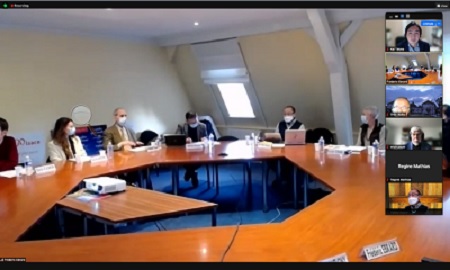 [High flex conference]
[High flex conference]
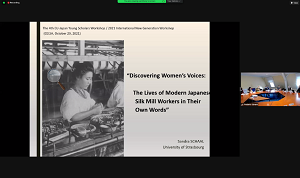
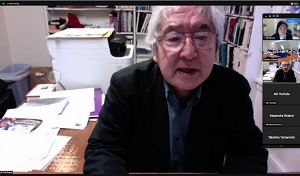
[Keynote 1] Sandra SCHAAL [Keynote 2] Naoki SAKAI
(Strasbourg university, France) (Cornell University, USA)
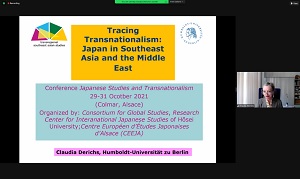
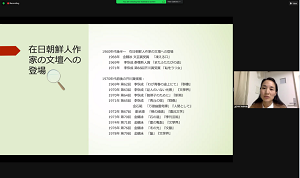
[Keynote 3] Claudia DERICHS [Presenter 2] Aki YOSHIDA
(Humboldt University of Berlin, Germany) (National Institute for Oriental Languages and Civilizations, France)
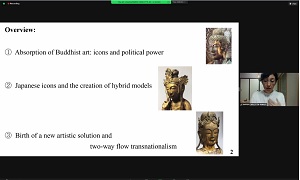
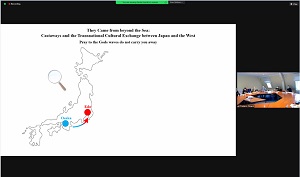
[Presenter 3] Maria Carlotta AVANZI [Presenter 5] Danila KASHKIN
(Akita Prefectural University, Japan) (University of Geneva, Switzerland)
Kei Takata (Hosei University)
Yusuke Suzumura (Meijo University)

